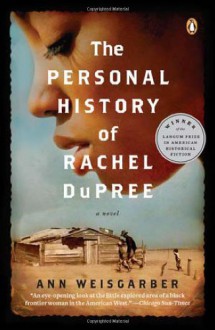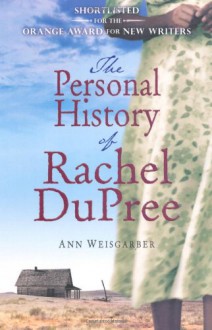
 Ann Weisgarber spent seven years on the research and writing of The Personal History of Rachel DuPree, her first novel, and has been rewarded for her efforts with several literary honors, including an Orange Prize nomination (the book was first published in England). The research enables Weisgarber to bring her story to life with careful details, but the most effective detail she uses is her title character's narrative voice.
Ann Weisgarber spent seven years on the research and writing of The Personal History of Rachel DuPree, her first novel, and has been rewarded for her efforts with several literary honors, including an Orange Prize nomination (the book was first published in England). The research enables Weisgarber to bring her story to life with careful details, but the most effective detail she uses is her title character's narrative voice. This is the kind of book that makes me joyful as a reader. It's immediately engrossing, it illuminates a life that is otherwise foreign to me, and paints real landscapes and situations I've never experienced. Set in 1917 at a ranch in South Dakota by the Badlands, the story is told by Rachel DuPree, an African-American woman who married an ambitious man, whose entire identity and self-value is tied up in the land he owns. The book opens with a punch: a longstanding drought requires the extreme measure of lowering the smallest child into the ranch's well in order to scoop up what water may be had. From the beginning, Rachel is torn between desperately wanting the water to keep her children and livestock alive yet wracked with horror at her acquiescence of this act. This book is emotional but not out of any lurid or melodramatic scenes -- instead, the oomph comes from the hard reality of life for Rachel and her children. Alternating between Rachel's present and flashing back to how she ended up in South Dakota in 1917, we learn about two hard, determined people -- Rachel and her husband Isaac -- and the results of a gamble and a hope. The grim basis of Rachel and Isaac's marriage was what grabbed at my heart the most -- it was at times beautiful and at times horrifically cruel. But I could completely appreciate Rachel's loyalty and the choices she made because she was such a real character. Race, understandably, features in this novel: the discussion of skin color shade among the society African-Americans in Chicago, the perception of Booker T. Washington and Ida B. Wells in the African-American community, and the 'us-vs-them' story created by the homesteaders and settlers to differentiate themselves from the Native Americans on the reservations in South Dakota. Class and education also affect the story and characters, as both Rachel and Isaac want something more for themselves and their children -- but have wildly differing ideas as to what that means. Again, what was so compelling for me as I read was this marriage and Rachel's challenge to balance her happiness, her children's well-being, and her husband's wishes with what she thinks is right. Upon finishing, I immediately thought two things: one, that one should vacation to the Badlands because they are staggeringly gorgeous but OMG, I never want to live there again; and two, that I wanted there to be another book. Although the ending of this one was perfect, I could have used another 300 pages or a second volume to follow Rachel and her family some more. I was reminded a bit of Sigrid Undset's Kristin Lavransdatter (a favorite of mine that I never wanted to end!). This would make an excellent book club selection since the themes of family, obligation, compromise in marriage, and prejudice are common ones. Apparently this book has been optioned for a film, so read it now before the movie is released!
This is the kind of book that makes me joyful as a reader. It's immediately engrossing, it illuminates a life that is otherwise foreign to me, and paints real landscapes and situations I've never experienced. Set in 1917 at a ranch in South Dakota by the Badlands, the story is told by Rachel DuPree, an African-American woman who married an ambitious man, whose entire identity and self-value is tied up in the land he owns. The book opens with a punch: a longstanding drought requires the extreme measure of lowering the smallest child into the ranch's well in order to scoop up what water may be had. From the beginning, Rachel is torn between desperately wanting the water to keep her children and livestock alive yet wracked with horror at her acquiescence of this act. This book is emotional but not out of any lurid or melodramatic scenes -- instead, the oomph comes from the hard reality of life for Rachel and her children. Alternating between Rachel's present and flashing back to how she ended up in South Dakota in 1917, we learn about two hard, determined people -- Rachel and her husband Isaac -- and the results of a gamble and a hope. The grim basis of Rachel and Isaac's marriage was what grabbed at my heart the most -- it was at times beautiful and at times horrifically cruel. But I could completely appreciate Rachel's loyalty and the choices she made because she was such a real character. Race, understandably, features in this novel: the discussion of skin color shade among the society African-Americans in Chicago, the perception of Booker T. Washington and Ida B. Wells in the African-American community, and the 'us-vs-them' story created by the homesteaders and settlers to differentiate themselves from the Native Americans on the reservations in South Dakota. Class and education also affect the story and characters, as both Rachel and Isaac want something more for themselves and their children -- but have wildly differing ideas as to what that means. Again, what was so compelling for me as I read was this marriage and Rachel's challenge to balance her happiness, her children's well-being, and her husband's wishes with what she thinks is right. Upon finishing, I immediately thought two things: one, that one should vacation to the Badlands because they are staggeringly gorgeous but OMG, I never want to live there again; and two, that I wanted there to be another book. Although the ending of this one was perfect, I could have used another 300 pages or a second volume to follow Rachel and her family some more. I was reminded a bit of Sigrid Undset's Kristin Lavransdatter (a favorite of mine that I never wanted to end!). This would make an excellent book club selection since the themes of family, obligation, compromise in marriage, and prejudice are common ones. Apparently this book has been optioned for a film, so read it now before the movie is released!
 Anne Weisgarber 2009 novel (also her debut novel) follows the story of Rachel DuPree, the wife of Isaac DuPree a proud landowner in the South Dakota Badlands in the 1917. The lands have been recently caught in a bad drought, and Rachel is pregnant and struggling to feed her family. The events of the drought lead to her beginning to re-assess her life and leads to an almost Doll's House like conclusion.I wasn't particularly enamoured with this book. What I did like was the writing style; it's told entirely from the perspective of Rachel, which is carried through right down to the grammar, which is quite rare. Plus, Weisgarber's descriptions of the Badlands brought them wonderfully to life, and also the made you feel like you were there inside the DuPree family home and ranch. I also really liked the way that Weisgarber managed to weave in the 'personal history' of Rachel; rather than kind of shoe-horning her past into the narrative. Character-wise, I felt that the children; Mary, John, Alise & Emma were all wonderfully fleshed out, their actions seemed very realistic for young children.However, I did have problems with it. Firstly, I felt that the character of Isaac DuPree wasn't really fleshed-out properly, although this is naturally a problem with first-person narrative. I wanted to know more about him, and he was painted as an unsympathetic, land-driven character; and to my mind there must have been something driving this desire that wasn't heard. Plus, I occassionally struggled to have sympathy for Rachel herself. She married Isaac knowning that he didn't necessarily love her, and offering herself basically as a helper for his time on the ranch. Yet now she feels hurt that he doesn't love her, and from the moment I read the chapter about the early part of their relationship I struggled to gather what exactly Rachel would expect from essentially selling herself to a man (he would get more land if he married her), an idea she put forward herself.I occasionally wondered why Weisgarber made the DuPrees African-American as well; there seemed many times when their race didn't really matter. Although it did enable there to be brief discussions about race riots, and about the double standards in the way that they in turn were prejudiced against Native Americans.The Personal History of Rachel DuPree is by no means an bad book, the prose is lovely but I guess I just didn't click with the main character, which is a problem when it's first person narrative. I will be interested to see what Weisgarber's future novels will be like.
Anne Weisgarber 2009 novel (also her debut novel) follows the story of Rachel DuPree, the wife of Isaac DuPree a proud landowner in the South Dakota Badlands in the 1917. The lands have been recently caught in a bad drought, and Rachel is pregnant and struggling to feed her family. The events of the drought lead to her beginning to re-assess her life and leads to an almost Doll's House like conclusion.I wasn't particularly enamoured with this book. What I did like was the writing style; it's told entirely from the perspective of Rachel, which is carried through right down to the grammar, which is quite rare. Plus, Weisgarber's descriptions of the Badlands brought them wonderfully to life, and also the made you feel like you were there inside the DuPree family home and ranch. I also really liked the way that Weisgarber managed to weave in the 'personal history' of Rachel; rather than kind of shoe-horning her past into the narrative. Character-wise, I felt that the children; Mary, John, Alise & Emma were all wonderfully fleshed out, their actions seemed very realistic for young children.However, I did have problems with it. Firstly, I felt that the character of Isaac DuPree wasn't really fleshed-out properly, although this is naturally a problem with first-person narrative. I wanted to know more about him, and he was painted as an unsympathetic, land-driven character; and to my mind there must have been something driving this desire that wasn't heard. Plus, I occassionally struggled to have sympathy for Rachel herself. She married Isaac knowning that he didn't necessarily love her, and offering herself basically as a helper for his time on the ranch. Yet now she feels hurt that he doesn't love her, and from the moment I read the chapter about the early part of their relationship I struggled to gather what exactly Rachel would expect from essentially selling herself to a man (he would get more land if he married her), an idea she put forward herself.I occasionally wondered why Weisgarber made the DuPrees African-American as well; there seemed many times when their race didn't really matter. Although it did enable there to be brief discussions about race riots, and about the double standards in the way that they in turn were prejudiced against Native Americans.The Personal History of Rachel DuPree is by no means an bad book, the prose is lovely but I guess I just didn't click with the main character, which is a problem when it's first person narrative. I will be interested to see what Weisgarber's future novels will be like.